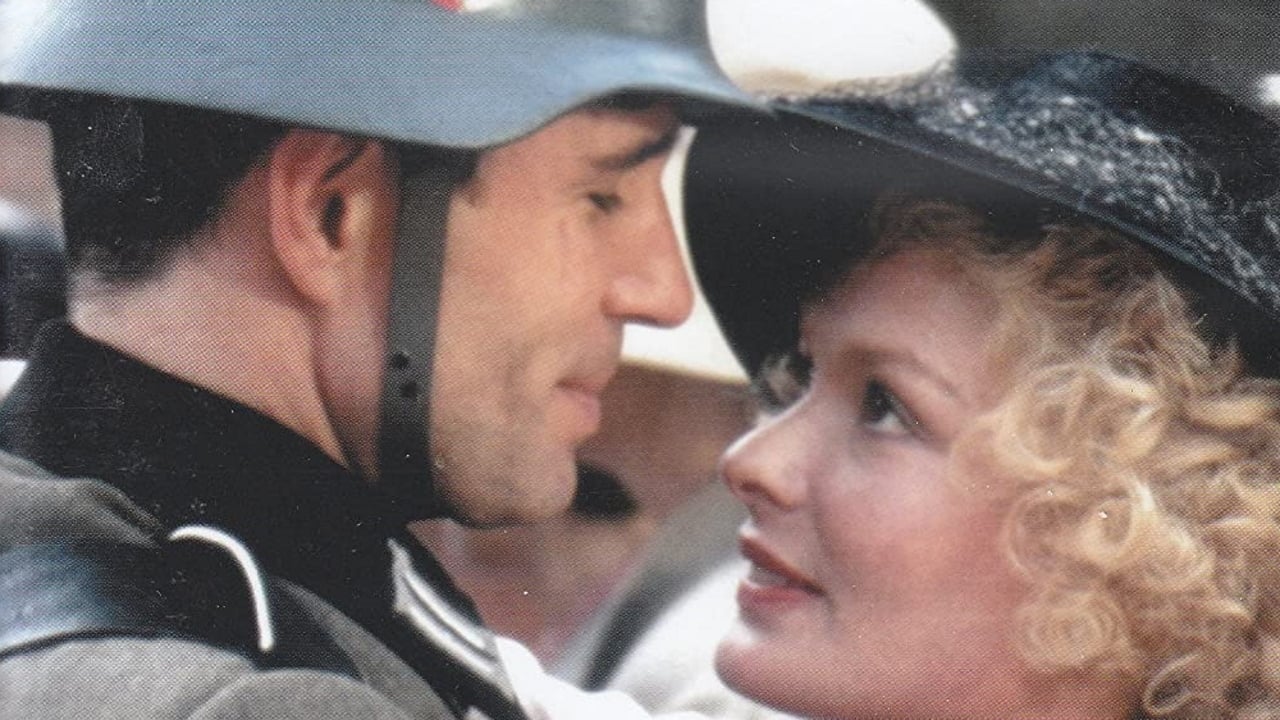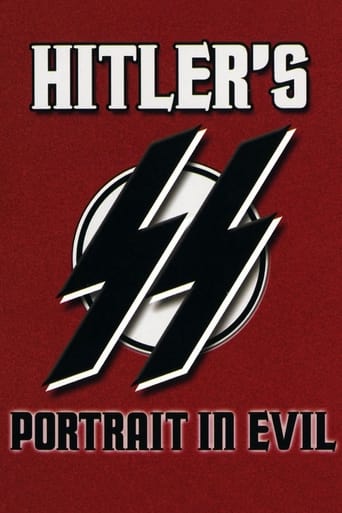Cathardincu
Surprisingly incoherent and boring
MamaGravity
good back-story, and good acting
ChampDavSlim
The acting is good, and the firecracker script has some excellent ideas.
Payno
I think this is a new genre that they're all sort of working their way through it and haven't got all the kinks worked out yet but it's a genre that works for me.
mark.waltz
John Shea and Bill Nighy are excellent as two German brothers involved in the most brutal example of human evil in recent memory, dealing with the rise of Adolf Hitler in completely different ways. They come from a good family, and with issues facing Germany's economy after World War 1 their lives are headed in different directions. At one point, they are fighting to protect Jewish Professor Jose Ferrer from attacks of vicious young S.S. leaders of the not yet fully powerful Nazi party, but destiny will change all that.All you really have to do is pick up history books to read about the atrocities of 20th Century leaders like Hitler, Lenin and Mao Tse Tung, but to see it either through newsreels or various dramatic adaptions has quite a larger impact. What makes this stand out is the psychological look into the reasons why certain Germans supported the Nazi party, and it wasn't a belief in what they were doing to those they knew who just happened to not be what the Reich considered to be the perfect "Arian".The brutalities are often downright inhumane, so be prepared. Jews, homosexuals, the mentally ill, other various enemies of the state. They all get their time here in being depicted. Lucy Gutteridge is lovely as the young lady whom one of the brothers love, first against their rise, later seen entertaining them in Russia. Emulating the emcee from "Cabaret", Tony Randall scores in a small role as an obviously gay spy. In his memory of serving in World War II, veteran Broadway producer/director Harold Prince recalled seeing characters just like Randall's and "Cabaret's" emcee, a staple in German cabarets even after the war.Hitler is caught on camera several times, often sneaking around to catch a victim of his atrocities, in one case one of his own men with another man. This T.V. movie doesn't fail to leave out much detail but jumps from year to year with a jarring effect. It doesn't impact the overall intensity of the film which also features David Warner and Carroll Baker in important parts. Thus doesn't delve much into the Holocaust, but that had already been dealt with in a T.V. mini-series. What it does show is the social anxiety of humanity outside the walls of concentration camps, on the streets where other horrendous events were taking place, destroying innocent lives and cowardly souls in the process.
Armand
at first sigh + a sketch about Nazi history . at the second - an inspired remember about birth and fall of a regime, about the touch of politics against family, about ideal and truth. it is not a movie for history fans and it is not the Schindler List. it could be an introduction to a large theme but, in same measure, slice of good acting. because it present in different manner the spirit of a period. and that fact is a good job. it introduce the viewer in the heart of evil not very convincing in many scenes but useful. and that fact is real important for understand a machine of power. Bill Naghy seems be a kind of clone of Peter O'Toole in the Night of Generals and this fact is an interesting detail. John Shea use a special experience who gives to role a nice game of nuances. Jose Ferrer is himself. and , without be a great movie, it is an useful remember.
Robert J. Maxwell
Judging from the theme, the sensational title ("Hitler's SS: Portrait in Evil"), and the time of its appearance (seven years after the award-winning "Holocaust"), I didn't expect much. And it IS a made-for-television movie after all. Instead, I found it was surprisingly well written, directed, and in some cases nicely acted.The story of a German family before and during World War II takes us from the rise of Hitler in the early 30s to the end of the war. Some of the material is familiar. We see the persecution of Jewish friends, the heaps of naked, pale corpses, the gloom of Stalingrad, the growing disillusion with Hitler, and some interpolated combat footage. But there are extraordinary glimpses of incidents we seldom see on screen. The assassination of Heydrich, for instance, and the rich detail surrounding Hitler's justification for an invasion of Poland.I said it was "informative" and that's the sort of thing that makes it so: Hitler's elimination of Roehm's rival Brown Shirts, the set up for Poland, the suppression of unions, the incredibly young age of some of the Volkssturm. And, oh, how we need that information.In more than one anonymous on-line chat, I read a post claiming that the current administration in Washington was the same as Hitler's because they were both "socialists." I made a polite query in each case, along the lines of, "Are you insane?" The replies were filled with an incandescent anger, accusing me of being stupid, because I didn't know that Hitler led "the National SOCIALIST party," capitals included. Most Americans have a general idea of what Hitler thought and did, but some of us are appallingly ignorant of what used to be a shared data base.Even if this two-and-a-half hour film weren't as nicely executed as it is, it would still be worth watching for some of us. And, probably for MOST of us, we'd still learn something we didn't know. Most documentaries, for example, show Hitler invading Poland in the course of a few seconds of rolling tanks and of troops pushing aside a road barrier. That's fine, as far as it goes.But Hitler went to astonishing lengths to justify that invasion. It had to be convincing, and it was. The official story was that Poland had been persecuting its German-speaking population and had raided a German radio station near the border, leaving some German corpses behind. The fresh cadavers were supplied by the Germans simply killing some prisoners in one of their camps and strewing the bodies about, near the radio station. No one ever starts a war. It must always be the other guy's fault if you want the war to have popular support. That's taken for granted. It's why the US Secretary of War became the Secretary of Defense in 1949.I don't want to get too far off track, so let me mention that, in addition to the professional direction of Lukas Heller, there is a fine performance by David Warner as Heydrich. Tony Randall, barely recognizable under his Joel Grey make up, is a convincing and pitiful figure as the harmless homosexual nightclub comedian beaten to death by the SS. John Normington as Himmler doesn't have much screen time but makes the most of it in a subdued and nuanced performance. The most difficult role is that of Helmut Hoffman, the "mean" son, as opposed to Michael Shea's "idealistic" son. Hoffman does "neurosis" really well, and he looks the part, resembling both in appearance and demeanor Peter O'Toole's Lawrence of Arabia.It ought to be shown in every high school or college class in political science or history.
Wolfram-4
This was a rather good film. It artfully tells the story of the days just after the Nazi "Machtergreifung", and the power struggle between Himmler's SS (with Heydrich's SD an important part) and Ernst Röhm's SA, through the Hoffman family. Karl, a seeming true-blue National Socialist, joins the SA. His brother Helmut, an opportunist, joins the SS for career advancement, and deluding himself into believing that by being in the SS, he could "Do good on the inside".This film does an excellent job in examining the motivations of Nazis, and of human feelings through Karl and Helmut's sibling rivalry. The acting was excellent, featuring Jose Ferrer as Helmut's old teacher, who is a Jew. However, I found the actress playing Mitzi to be repulsively vacuous. Tony Randall's cameo appearance was brilliant, among others.Where this film fails is that it tries to do too much. Ity tries far too hard to address every issue involved in discussing the Third Reich, from Anti-Semitism, to the cause of the war, to the Hitler Youth, to propaganda, and so forth. This causes much superficiality, so that none of these topics is thoroughly addressed. The largest strength to this film, is that it so bravely and accurately portrays a historic episode, known as the Night of the Long Knives, in which Hitler has Röhm, and his SA leadership killed, presumably because they were planning a Putsch against Hitler. It re-examines an old issue, and it does it cunningly.

